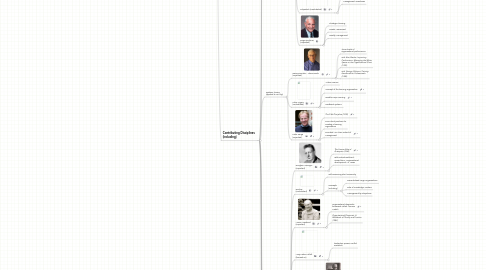
1. Key People (including)
1.1. Harless - HPT (contributed)
1.1.1. Phrase "Front End Analysis"
1.1.2. Front End Analysis Model
1.2. Dale Brethower - HPT (contributed)
1.2.1. Five Performance Principles
2. Contributing Disciplines (including)
2.1. Diagnostic/Analytical Systems (applied to HPT by)
2.1.1. William Thompson (contributed)
2.1.1.1. "If you cannot measure it, you cannot improve it
2.1.1.2. Founded International Electrotechnical Commission
2.1.2. W. Edwards Deming (contributed)
2.1.2.1. 14 Points model of Quality Management
2.1.2.2. Quality, Productivity, and Competitive Positions (1982)
2.1.2.3. "In God we Trust, all others bring data"
2.1.3. Henry Gantt (contributed)
2.1.3.1. Process Diagramming Method
2.1.3.2. Pioneered Pay for Performance
2.1.4. Joseph Juran (contributed)
2.1.4.1. Referenced in Motorola's Six Sigma program
2.1.4.2. Father of Quality Management
2.1.4.3. Managing Business Process Quality principle
2.2. Behaviorism (applied to HPT by)
2.2.1. B.F. Skinner (contributed)
2.2.1.1. Theories serve as the foundation for HPT
2.2.1.2. Considered originator of contemporary instructional design
2.2.1.3. The Science of Learning and the Art of Teaching (1954)
2.2.1.4. Science and Human Behavior (1953)
2.2.1.5. Operant Conditioning
2.2.1.6. Operant Conditioning Chamber (the Skinner Box)
2.2.1.7. Phrases (including)
2.2.1.7.1. Behavior Modification Operant Conditioning
2.2.1.7.2. Reinforcement of Successive Approximations
2.2.1.7.3. Social Engineering
2.3. Organizational Learning/ISD (applied to HPT by)
2.3.1. Robert Gagne (Contributed)
2.3.1.1. Information Processing Model
2.3.1.2. 5 Types of Learning
2.3.1.3. Quality, Productivity, and Competitive Positions (1982)
2.3.2. Robert Mager (contributed)
2.3.2.1. Preparing Instructional Objectives (1984)
2.3.2.2. Mager "Six Pack"
2.3.2.3. Performance Analysis Flowchart
2.3.3. Sivasailam "Thiagi" Thiagarajan - Games (impacted)
2.3.3.1. Serious play, games, and fun as performance interventions
2.3.3.2. Pioneer/Leader of International Society for Performance Improvement (ISPI)
2.3.4. Benjamin Bloom (contributed)
2.3.4.1. Bloom's Taxonomy of intellectual behaviors
2.3.4.2. Mastery Learning
2.3.5. Malcolm Knowles - Andragogy (contributed)
2.3.5.1. The Adult Learner: A Neglected Species (1990)
2.3.5.2. The Modern Practice of Adult Learning: Andragogy versus Pedagogy (1970)
2.3.5.3. Father of adult learning
2.3.6. Susan Markel (impacted)
2.3.6.1. Good Frames and Bad: A Grammar of Frame Writing (1964)
2.3.6.2. Programmed Instruction
2.3.7. Kirkpatrick (Contributed)
2.3.7.1. 4-Level Framework of Evaluation
2.3.7.2. Management Inventories
2.3.8. Roger Kaufman (impacted)
2.3.8.1. Strategic Planning
2.3.8.2. Needs Assessment
2.3.8.3. Quality Management
2.4. Systems Theory (applied to HPT by)
2.4.1. Geary Rummler - Three Levels (impacted)
2.4.1.1. Three levels of organizational performance
2.4.1.2. with Alan Brache: Improving Performance: Managing the White Space on the Organizational Chart (1990)
2.4.1.3. with George Odiorne: Training: Handbook for Professionals (1988)
2.4.2. Chris Argyris (contributed)
2.4.2.1. Action Science
2.4.2.2. Concept of the learning organization
2.4.2.3. Double-Loop Learning
2.4.2.4. Feedback Systems
2.4.3. Peter Senge (impacted)
2.4.3.1. The Fifth Discipline (1990)
2.4.3.2. Five critical practices for creating a learning organization
2.4.3.3. Founded MIT Sloan School of Management
2.5. Management Sciences (applied to HPT by)
2.5.1. Douglas McGregor (impacted)
2.5.1.1. The Human Side of Enterprise (1960)
2.5.1.2. with Richard Beckhard, coined term "organizational development" in 1950s
2.5.2. Drucker (contributed)
2.5.2.1. Self-Governing Plant Commnity
2.5.2.2. Concepts (including)
2.5.2.2.1. Decentralized Large Organizations
2.5.2.2.2. Role of Knowledge Workers
2.5.2.2.3. Management by Objectives
2.5.3. Marvin Weisbord (impacted)
2.5.3.1. Organizational diagnostic framework called "Six Box Model"
2.5.3.2. Organizational Diagnosis: A Workbook of Theory and Practice (1982)
2.5.4. Mary Parker Follett (focused on)
2.5.4.1. leadership, power, conflict resolution
2.5.5. Hawthorne Studies
2.5.5.1. Fritz Roethlisberger (also wrote)
2.5.5.1.1. Management and the Worker (1939)
2.5.5.2. Elton Mayo (founded))
2.5.5.2.1. Human Relations Movement
2.5.5.3. William Dickson (contributed as))
2.5.5.3.1. Chief of Employee Relations Research Department at the Hawthorne plant
2.5.6. Henri Fayol (contributed)
2.5.6.1. General and Industrial Management
2.5.7. Frank & Lillian Gilbreth (contributed)
2.5.7.1. process charts for manufacturing
2.5.7.2. Motion studies
2.5.7.3. Process Improvement
2.5.8. Frederick Taylor (contributed)
2.5.8.1. Idea that productivity increases when workers have input
2.5.8.2. Father of Performance Improvement
2.5.8.3. Principles of Scientific Management
2.6. Organization Development/Change Management (applied to HPT by)
2.6.1. Thomas Gilbert (contributed)
2.6.1.1. Human Competence (1978)
2.6.1.2. Behavioral Engineering Model
2.6.1.3. A founder of ISPI
2.6.1.4. Started Performance Improvement Quarterly
2.6.2. Victor Vroom - motivation (contributed)
2.6.2.1. Expectancy Theory
2.7. Psychology (applied to HPT by)
2.7.1. Abraham Maslow (contributed)
2.7.1.1. Psychological Theory of Needs
2.7.1.2. Father of Humanistic Psychology
2.7.1.3. "If the only tool you have is a hammer, you tend to see every problem as a nail"
2.7.2. Frederick Herzberg (focused on)
2.7.2.1. Motivator factors related to Maslow's higher level needs for job satisfaction
2.7.2.2. Two-Factor theory
2.7.3. Kurt Lewin (impacted)
2.7.3.1. Three-stage organizational change process
2.7.3.2. Participative management
2.8. Evaluation (applied to HPT by)
2.8.1. Donald Tosti (impacted)
2.8.1.1. Critical characteristics of feedback
2.8.1.2. Application of HPT to organizational change culture
2.9. Sociology
2.9.1. Max Weber (contributed)
2.9.1.1. Specialization theories
2.9.1.2. The Protestant Ethic and the Spirit of Capatilism
2.9.1.3. Economy and Society
2.9.1.4. Founder of modern socialism
